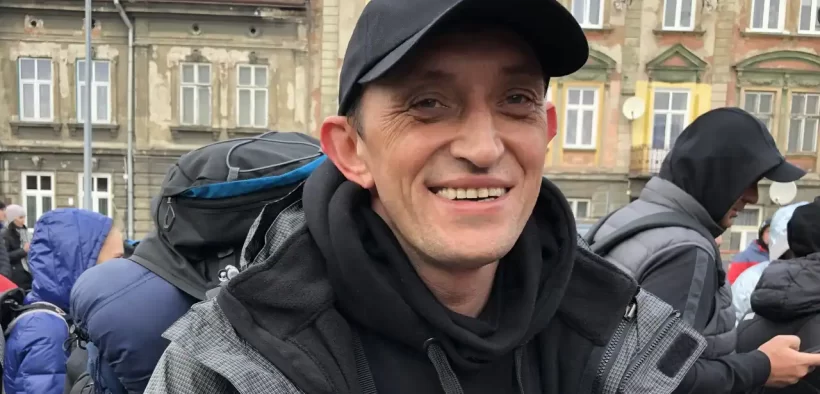These Ukrainians are heading home to defend their country against Russia

Standing in a long, serpentine queue alongside where the previous arrivals walked out is a group of passengers waiting to take the train back to Lviv. It is a relatively young line of people, many of them men, some dressed in army fatigues or wearing camouflage backpacks.
Their declaration is far from subtle. They are preparing to cross the Polish border, and away from the safety it affords, to defend their country.

“I must help, must go,” says Igor Matviyko, a dual Irish-Ukrainian national who travelled from Dublin.
He plans to join forces in Dnipro, central Ukraine, which has come under regular shelling since the conflict ignited.
“I’m ready because all my friends are waiting for me now,” Igor says before emitting a dark laugh as he speaks of Russian President Vladimir Putin.
“I have only one plan, to f***ing kill him.”
Igor is one of many, not just Ukrainians, who have heeded the call of Ukraine’s President Volodymyr Zelenskyy to “citizens of the world” to help defend Ukraine.
Australian Prime Minister Scott Morrison and Foreign Minister Marise Payne have both advised against Australians travelling to Ukraine to take up arms.
Under Australian law, people cannot engage in hostile activities overseas unless serving in the armed forces of a foreign country.
Waiting in line near Igor is a burly man named Vladimir, who also plans to fight the Russians.
“My family in Ukraine, my wife, my son, so yes, I go,” he says.
When asked why he has decided to fight, Vladimir scoffs.
“Why?” he answers curtly. “My land [is on] fire.”
Refugee numbers swell
As for those who have just escaped the bloodshed, many pack the Przemyśl train terminal, receiving hot soups and cold drinks from volunteers as they contemplate the main question currently facing Ukraine’s refugees – where to next?
Maryna is waiting for the train to Warsaw with her daughter and cat, but it is only for a few weeks at this stage,
They hid in their bathroom in Kyiv for four days, as escalating violence reached their doorstep.
“I look out my window and I see several armed men running and shooting and I just cannot believe my eyes. It looks like a game,” Maryna says.
“I can’t say we didn’t expect it, but we didn’t believe until it was the very last moment that we’d have to leave.”

Maryan says she did not have a plan when they eventually fled Kyiv, so much so that when they did eventually flee, she forgot her phone and credit card at home.
“I’m horrified. I’m a historian, so I know how it is; how the previous episodes of our wars [played out]. I don’t want it to be returned.”
Ukrainians who are suddenly with no home are increasingly relying on Polish hospitality.
At the Speciajalny Osrodek Szkolno in Przemyśl, a school that teaches children with special needs, its dorm rooms have become a temporary home for refugees and its gymnasium converted to a donation centre.
Adama Bechawska-Pajak, the deputy principal, says this is the first time such a response has ever been attempted.

“We don’t sleep. We work,” she says.
“Our teachers, they’re volunteers. And before they work or after they work, they come here, they help.
“I feel very proud, you know? Because now I see we have big hearts.”
Among the 20 or so refugees staying at the school is one woman who came from Kyiv with her mother, 12-year-old son and dog.
Terrified for the fate of her husband still in the Ukrainian capital, she only speaks on condition of anonymity,
“Every day, my husband I speak like it’s the last time we will hear each other’s voices,” she says in her native Ukrainian.
“And once we say goodbye it’s as if it’s for forever because we don’t know what will happen next.”

More than one week into this conflict in Ukraine and the numbers of people in Poland are still swelling.
It is expected to stay that way for some time, but its border cities are proving key transit points; not only offering refuge for the more than 500,000 people who fled to Poland, but providing safe passage for those willing to return.











